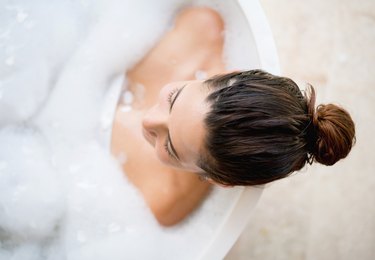
A long, hot bath is something you may look forward to after a day at work or a stressful situation. Baths are a convenient stress reliever because almost everyone has a bath tub. If you are experiencing sore muscles or aches, a bath may help to relax muscles and make the pain and discomfort more manageable.
Home Remedies for Sore Muscles
Video of the Day
Muscle aches and soreness is often related to stress on muscle or joints. Injuries to joints can also cause muscle aches and soreness. However, these symptoms can also be caused by certain medical conditions.
Video of the Day
Autoimmune conditions such as fibromyalgia and lupus can cause muscle cramping and soreness. A hot bath or hot tub may help relieve symptoms. In fact, according to the Fibromyalgia Awareness Association, participating in one warm-water physical activity has been shown to have an immediate effect on pain reduction.
Tip
Rheumatoid arthritis, Parkinson's disease and certain electrolyte imbalances can also lead to muscle soreness.
Your doctor may recommend physical therapy that might include the use of hot packs, a whirlpool, aquatic therapy or other forms of heat.
Read more: Sore Muscles From Running & a Hot Tub
Bath for Sore Muscles
Heat therapy, such as a bath for sore muscles, increases blood flow and elasticity of connective tissue. This means that if you have a tight muscle, a warm bath can help it to relax. Heating a sore area can also make it easier to stretch tight muscles.
Not all fitness experts race to jump into a hot bath or hot tub to soak their achy joints. Cold immersion can be included among effective home remedies for sore muscles as well.
Soreness happens when lactic acid and other wastes collect in your muscles through your blood vessels. Cold water temperatures constrict blood vessels to help reduce inflammation.
Cold immersion also decreases nerve conduction velocity, or the speed at which messages are delivered to your brain. As a result, cold immersion can help decrease pain.
According to a 2014 study published by Postgraduate Medicine, cold therapy is also effective for reducing muscle spasms.
Taking a cold bath can be challenging, but try to use the coldest temperature you can tolerate. You can even add a bag or two of ice to the tub if desired.
Pass the Salt
In your bathtub, you can add certain ingredients that may also help relax muscles. Consider adding sea salt or Epsom salts to your bath — this will help reduce swelling and calm your central nervous system. You may also want to use essential oils that can help relax you and help sore muscle groups such as eucalyptus, bergamot and lavender.
Read more: What Does Epsom Salt Do for soreness?
Additional Bath Benefits
Initially, a cold compress or cold bath will help numb your injured muscles and relieve pain. Days after your injury or workout, you may choose a hot bath for your muscle aches; the heat will penetrate and relax muscles, reducing the risk for spasms.
A hot bath also reduces stress levels all over your body. You may not realize it, but when you have muscle soreness in one area, the surrounding areas may tense up from working harder to compensate for the sore, weak muscle groups. The bath can relax the muscles and prepare them for stretching and your next workout.
- Spine-Health: Benefits of Heat Therapy for Lower Back Pain
- Care2: 13 Wonderful Ways to Use Epsom Salts
- PainScience.com: Hot Baths for Injury & Pain
- Sports Science: Cold Water Immersion; Practices, Trends and Avenues of Effect
- Fibromyaliga Awareness Association: A Beginner's Guide to Fibromyalgia
- Postgraduate Medicine: Mechanisms and Efficacy of Heat and Cold Therapies for Musculoskeletal Injury